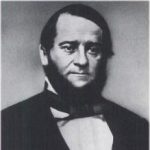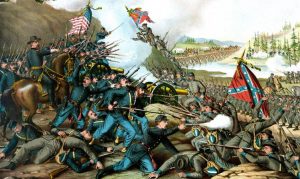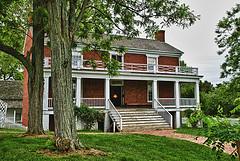 Following his marriage to a wealthy widow named Virginia Mason, Wilmer McLean moved onto her small plantation in Manassas Junction, Virginia. The property was beautiful, and a small stream called Bull Run ran through it. Fourteen slaves tended the fields of Yorkshire, named for the home county of English native Richard Blackburn who had established the plantation in the early 1700s. Little did Wilmer know at the time of his marriage, that in a mere eight years, their plantation would be the center of the beginning of the American Civil War.
Following his marriage to a wealthy widow named Virginia Mason, Wilmer McLean moved onto her small plantation in Manassas Junction, Virginia. The property was beautiful, and a small stream called Bull Run ran through it. Fourteen slaves tended the fields of Yorkshire, named for the home county of English native Richard Blackburn who had established the plantation in the early 1700s. Little did Wilmer know at the time of his marriage, that in a mere eight years, their plantation would be the center of the beginning of the American Civil War.
When the Civil War broke out in 1861, McLean was too old to serve on the Confederate Army, but that did not prevent his involvement in the war. When I think of the Civil War, I somehow think of two armies coming together out in the middle of nowhere in an open field. Of course, war isn’t that simple. War takes place in towns and villages and city streets too. When the two armies, the Union and the Confederates came to the place of their first battle, it would just happen to be ight in the middle of McLean’s plantation. The battle, the first major engagement between Union and Confederate forces, taking place in July 1861, would be remembered as the First Battle of Bull Run…fought right there at the stream on the McLean plantation.
As Union forces approached on a 30-mile march west from Washington DC, Confederate General P.G.T. Beauregard took over the Yorkshire Plantation farmhouse in Manassas as his headquarters. Soon, McLean took his family to safer ground, and the next day, July 18, 1861, during the Battle of Blackburn’s Ford, a Union shell tore into the fireplace of McLean’s detached kitchen and ruined the dinner being prepared for Beauregard and his staff. Three days later came the Civil War’s first major encounter, the First Battle of Bull Run. The barn quickly became a makeshift military hospital, housing both wounded Confederate soldiers and captured Union fighters. The men all shared the floor of the barn, which had become, in addition to the hospital, a prisoner of war jail, as well.
Yorkshire was ravaged in the battle, and when McLean had safely tucked his family far away from the battle, he returned alone to survey the damaged plantation. I’m sure it must have been a devastation blow to McLean, but he stayed worked as an unpaid Confederate quartermaster through February 1862, before reuniting with his wife and five children in the spring.
Back at home in Yorkshire in August 1862, McLean could not believe what he was seeing when the Second Battle of Bull Run began on the Yorkshire Plantation. It seemed that he just could not outrun the war and keep his plantation too. When the Union and Confederacy clashed once again in Manassas at the Second Battle of Bull Run in August 1862, McLean began to plan on a way to better protect his family from the war. In the fall of 1863, McLean moved his family 120 miles southwest to the quiet little town of Appomattox Court House on the other side of the state of Virginia. He purchased a beautiful house, originally built as a tavern in 1848, along the Lynchburg-Richmond State Road and regularly traveled on the nearby Southside Railroad to tend to his business supplying sugar to the Confederate army.
McLean thought he had finally managed to move his family to a place where they could live in peace and quiet, but little did he know that even in Appomattox, he could not outrun the Civil War. Once again, the Civil War came calling at his door again. On April 9, 1865, Confederate Colonel Charles Marshall rode into Appomattox Court House and asked the first man he spotted, who just happened to be McLean, to help him find a suitable home to hold a meeting between the Union and Confederate commanders. McLean showed him a place, but it was a pretty dilapidated, unfurnished brick house, and Marshall quickly rejected it. Reluctantly, McLean offered his own comfortable, well furnished home…hoping that this would not be a repeat of the beginning of the war, when his home was pretty close to being destroyed.
That afternoon, in pretty much the same place it had started…the McLean parlor, history was made as Confederate General Robert E. Lee surrendered his forces to Union General Ulysses S. Grant, marking the beginning of the end of the Civil War. McLean’s homes had become a “pair of bookends” to the long four year war. Like the first meeting between McLean and the army, this one would also not end well. As General Lee departed on his horse Traveler to break the news to his troops, the Union officers launched their final raid of the war by ransacking McLean’s parlor for souvenirs of the historic meeting. According to Civil War historian, Shelby  Foote, “Something close to pandemonium set in. As McLean protested, the Union entourage walked out with the tables and chairs used by Lee and Grant, a stone inkstand, brass candlesticks and even the favorite rag doll of his 7-year-old daughter, Lula. They tore apart McLean’s cane-bottomed chairs and cut upholstery strips from his sofas as mementoes. As compensation, the soldiers shoved money into the hands of the unwilling seller and threw it onto the floor when he refused to accept it.” War is an ugly thing, and men don’t always act in a gentlemanly way to the losers, or the winners. Nevertheless, the losers are often treated far worse than the winners, as has been seen in many a war.
Foote, “Something close to pandemonium set in. As McLean protested, the Union entourage walked out with the tables and chairs used by Lee and Grant, a stone inkstand, brass candlesticks and even the favorite rag doll of his 7-year-old daughter, Lula. They tore apart McLean’s cane-bottomed chairs and cut upholstery strips from his sofas as mementoes. As compensation, the soldiers shoved money into the hands of the unwilling seller and threw it onto the floor when he refused to accept it.” War is an ugly thing, and men don’t always act in a gentlemanly way to the losers, or the winners. Nevertheless, the losers are often treated far worse than the winners, as has been seen in many a war.


Leave a Reply